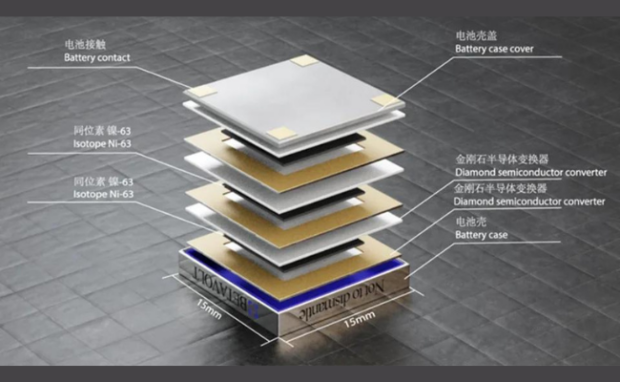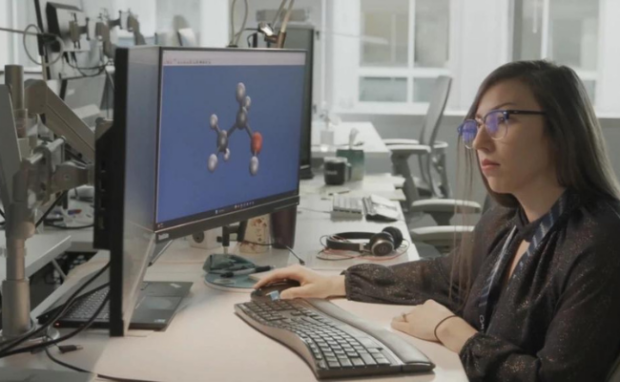Radioactive battery keeps your phone running for 50 years
Chinese tech firm Betavolt developed a radioactive battery that could keep your phone running for five decades. It uses decay energy to produce electrical energy but does not emit external radiation. As a result, this company claims it can power medical implants and larger devices safely.
Non-rechargeable batteries often leak toxic chemicals, and rechargeable ones can overheat and explode. Fortunately, this radioactive battery could become the next evolution of battery technology. Betavolt’s energy cell does not degrade, overheat, or run out of power for 50 years. As a result, future devices, from electric vehicles to your phone, may never need to recharge ever again!
This article will discuss how Betavolt created this battery tech marvel. Later, I will share some of the latest energy innovations from other parts of the world.
How did Betavolt create a radioactive battery?

Betavolt’s BV100 energy cell uses Nickel-63, which is a radioactive material. Also, it uses diamond semiconductors as energy converters.
Nickel-63 releases decay energy as it loses protons. The radioactive battery turns that into electrical energy.
Elements like nickel turn into new ones as they lose subatomic particles. Specifically, Nickel-63 transforms into copper as it loses electrons and protons.
This process turns it into a safe, recyclable material once it has operated for decades. Copper is an important component of all electrical devices.
Betavolt says its radioactive battery can remain stable and functional in extreme temperatures. Moreover, it can run at -60 °C to 120 °C without leaking or overheating.
In contrast, traditional, non-rechargeable batteries may ooze hazardous liquid after extended use. Also, rechargeable energy cells may overheat and explode when left in extreme heat.
More importantly, BV100’s modular design allows for versatile applications. For example, the Chinese company initially built a radioactive energy source for pacemakers and other medical implants.
That makes BV100 small enough for handheld gadgets like smartphones. Imagine your future phone running for 50 years without connecting to a power outlet or portable charger!
You may also like: Lunar samples show new Moon info
You may also deploy several of the revolutionary power sources for larger machines. For example, multiple BV100s could power satellites and artificial intelligence programs.
The company acknowledges fears of triggering Fukushima-like disasters with its invention. However, it allays the public’s fears by explaining that BV100 does not emit external radiation.
Betavolt said its radioactive battery is still in its pilot testing stage. Yahoo Finance said the Chinese tech pioneer will produce a 1-watt battery by 2025.
What is the future of battery tech?

Microsoft and the Pacific Northwest National Laboratory (PNNL) are helping the world create better batteries with AI. Their latest artificial intelligence found a new material that lets energy cells use 70% less lithium.
It is Azure Quantum Elements (AQE), a platform with high-performance computing and AI. This program suggested 32 million candidates, and then it discerned which ones were stable enough to use.
This tool cut down the number to roughly 500,000. Next, the researchers added filters to estimate how each material might conduct energy. They also simulated how molecules and atoms move within each material and assessed their cost and availability.
Eventually, the Microsoft experts only had 23 candidates, of which five were already known materials. Then, the Pacific Northwest National Laboratory synthesized one promising substance to test it.
PNNL produced a working battery from it to power a lightbulb and clock. Most importantly, the material has a combination of lithium and sodium.
You may also like: Experts warn AI is running out of training data
Sodium is the main component of salt, making it an abundant element. Microsoft says the new material could cut down the lithium used in batteries by 70%.
This material could become part of a solid-state battery safer than today’s lithium-ion batteries. PNNL staff scientist Vijay Murugesan and other experts praised the AI platform’s capabilities:
“Thirty-two million is something that we would never ever be able to do … Imagine a human sitting and going through 32 million materials and choosing one or two out of it. It’s just not going to happen,” said Murugesan.
Conclusion
Chinese company Betavolt invented a new radioactive battery that could power devices for 50 years without recharging. Moreover, it is significantly safer and sturdier than traditional batteries.
The BV100 might seem like science fiction, but imagine if it becomes mainstream. We would no longer need to recharge our gadgets, and pacemakers and other life-saving implants could maintain health longer.
Many technologies are crossing fiction into reality, such as artificial intelligence programs that are near to behaving like humans. Learn more about those and other digital trends at Inquirer Tech.